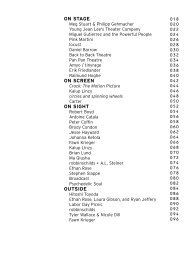BOMB Magazine: Shirin Neshat by Arthur C. Danto
BOMB Magazine: Shirin Neshat by Arthur C. Danto
BOMB Magazine: Shirin Neshat by Arthur C. Danto
Create successful ePaper yourself
Turn your PDF publications into a flip-book with our unique Google optimized e-Paper software.
<strong>BOMB</strong> <strong>Magazine</strong>: <strong>Shirin</strong> <strong>Neshat</strong> <strong>by</strong> <strong>Arthur</strong> C. <strong>Danto</strong> 5/17/10 1:58 PM<br />
<strong>Shirin</strong> <strong>Neshat</strong>, Rapture, 1999, video still.<br />
AD Fervor is the one film in which you’re relying on speech rather than music.<br />
Music really does overcome linguistic barriers. But in Fervor the man talks at great<br />
length, and one tries to infer what he is saying. And he points to a painting that is<br />
prominently displayed behind him.<br />
SN From the beginning, I thought about having subtitles. In fact, I had an excerpt<br />
of the speech translated, and created subtitles. However, many English-speaking<br />
friends came to see me while I was editing and almost all of them felt that subtitles<br />
made the work too literal, too obvious, and distracted from the clarity of the image.<br />
I regret that I did not have a translation on the exhibition wall so those people<br />
interested could have referred to it.<br />
AD Hmm . . . I’m of two minds on that. I really don’t know what the truth is there.<br />
SN The speech becomes very musical here.<br />
AD Yes, it does.<br />
SN It almost functions like an opera, you don’t really listen to the words, you<br />
imagine what has been said through the musical qualities. But I did get some<br />
criticism for the lack of subtitles; some people were not satisfied with guessing at<br />
what was being said. Let me tell you the meaning of the speech and a little about<br />
the speaker, whose character is quite dubious. He comes across as something<br />
between a politician, a mullah, and an actor. The event was also designed to<br />
resemble a political event, a religious ceremony or a theatrical story. I was inspired<br />
<strong>by</strong> public Friday prayers in Iran, where masses of men and women come together,<br />
but sit separately. Usually, a distinguished mullah leads the prayers and delivers a<br />
moral speech, each time focusing on a particular topic. So in Fervor this man comes<br />
on the stage and offers his moral speech which happens to be the problem of sin,<br />
particularly sin that arises from sexual behavior—carnal desire. He uses the story of<br />
Joseph (Youssef) and Zuleika from the Koran to exemplify the destiny of those who<br />
cannot control their sexuality. In the Koran, Zuleika, the female character, seduces<br />
Joseph. The painting in the film’s background illustrates the story. This type of<br />
theater is actually a traditional form in Iran, where a speaker stands in front of a<br />
painting to tell the story. It usually takes place in coffee houses.<br />
AD So the speaker uses the painting as the basis of a narrative.<br />
SN Exactly.<br />
AD How fascinating.<br />
SN I think Fervor, unlike Rapture and Turbulent, was not as easily understood <strong>by</strong><br />
Westerners.<br />
http://bombsite.com/issues/73/articles/2332 AD Enough of that narrative came across. For one thing, you feel that whatever the<br />
7 of 10<br />
message was, the man and the woman felt themselves beyond or above it, that<br />
they were really interested in their more fundamental view, namely each other.<br />
SN Exactly.






